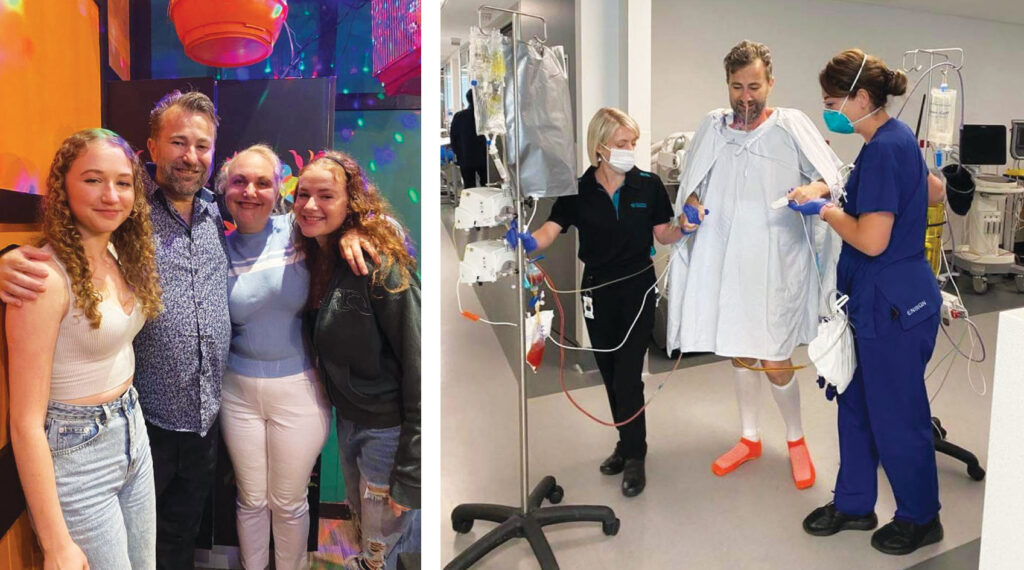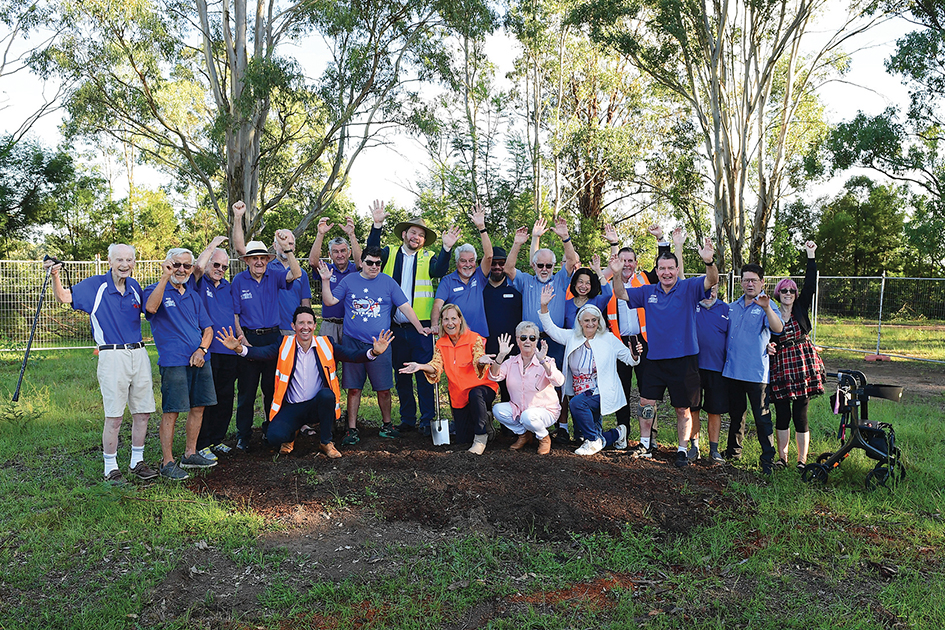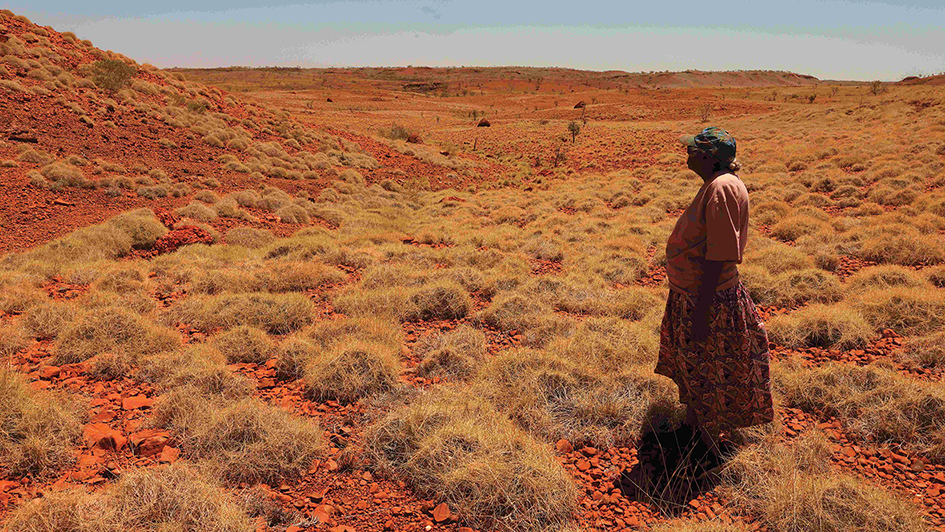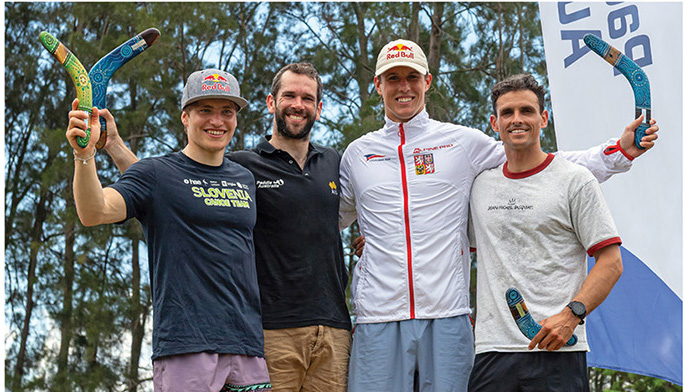Clinical trials are saving lives and PBS support is desperately needed
WHEN father-of-two from Emu Plains, Paul Mazurkiewicz was diagnosed with rare stage 4 inoperable gastro-intestinal stromal tumours (GIST) in his digestive system, he was given 6 to 12 months to live.
It’s now nearly five years since the diagnosis that rocked his – and his family’s – world, but medical science has kept him alive, offering him places in two clinical trials that have involved surgery and trial medications.
On the back of the recently recognised World GIST Day, Paul wants people to know that time is ticking for him and others with rare gastrointestinal cancers, which have vague symptoms like:
• Abdominal discomfort or pain.
• A lump or mass in the belly that you may be able to feel.
• Vomiting.
• Blood in stools or vomit.
GIST is a rare type of cancer found in the gastro-intestinal tract which is part of the body’s digestive system. The common location of GISTs is in the stomach (50 to 60%) and small intestines (30 to 40%). To date there is still a huge lack of education and awareness that exists within the general public about GIST.
Paul has had more than 8kgs of tumours removed through surgery and despite his fragile health he wants to draw attention to the inequality of treatment and care given to Australians with his condition.
Paul’s only hope is for more GIST clinical trials, advances in medical technology and medication being subsidised on the Pharmaceutical Benefits Scheme to ensure he can stay around long enough to see his girls grow older without financially ruining his family to treat his condition.
“I worked incredibly hard my whole life, I had done everything in my power to be self-sufficient and to care for my wife and children,” he wrote to former Health Minister Greg Hunt when trying to access the TKI medications that can extend his life.
“Despite Medicare, my private health insurance, my income protection insurance, my superannuation. Many of these drugs just not being on PBS were prohibitive in price. It’s hard to imagine how a self-funded Australian could access the drugs”

Paul has lived his whole adult life in the Penrith area, and grew up in Faulconbridge. He now resides in Emu Plains with wife Lisa and daughters Hannah and Chelsea. He was also busy working in his thriving Penrith business, PJM Lawyers.
You could say he had it all and was really living the dream; until it all came crashing down when test results revealed a prognosis that no person or family wants to hear.
Not only was it that dreaded C word, it was accompanied by the news that his days were numbered.
GIST has impacted every aspect of Paul’s life. He’s an extremely positive person despite all the challenges, but I asked him to first share some of those impacts on his life with us and he was very obliging.
“I have not practiced as a lawyer for two and a half years because of the disease and its progression. Lisa was also my partner in the firm, her work opportunity has been significantly curtailed by her need to care for me,” Paul said.
“It has impacted my life in so many ways, I can no longer work or run my own business, I have to pay someone to mow my lawn, friends often have to volunteer to help Lisa with heavy work in the yard or house because I am not capable.
“I can’t focus for very long, even reading a page or trying to draft an email is challenging.
“My girls were 12 and 14 when I was diagnosed so the stress and trauma in the home has had an effect on their studies and teenage life four and half years on. My social life has been significantly curtailed, I can’t drive long distances, I generally feel high levels of fatigue.
“Every aspect of my life has been impacted. Lisa always says all she and the girls care about is that I am here and I desperately don’t want to leave them.”
Paul spoke about his recent surgery.
“I was always told that I was not a candidate for surgery because of the spread of the cancer in my liver, 8-9 tumours and countless tumours in my peritoneum,” he said.
“About two months ago I found a surgeon who was prepared to do a “de Bulk” surgery, an attempt to remove a significant amount of my tumour burden. The surgery was a success in that they were able to move 8 kilos of tumours but I lost my large bowel, two meters of my small bowel and my entire omentum.
“The down side is that there is apparently about another 8 kilos of cancer still inside my body, about half could be safely removed.”
A treatment option comes in the form of a drug called Regorafenib or Stivarga. The drug is not curative; it generally makes the tumours go dormant, stop growing, stop feeding, basically switch off. Often some of the tumours will shrink considerably, if this works some people have lived over twenty years on targeted therapies.”
That is a massive amount of money to find per month – It’s higher than the mortgage of anyone I know. It would be a lot to dish out even when you’re working full-time, but most people with this kind of condition, including Paul, are not working – so where are they supposed to find that kind of coin to stay alive?
Some help has come from the beautiful Penrith community who’ve contributed to a Go Fund Me page set up for Paul by his friend Skye. The details are below if you can spare a few dollars.
So, in the face of such a devastating situation, how does Paul manage to stay positive?
“I stay positive because I appreciate every second I get to spend with my wife and daughters, I have an incredible friend group who are regularly in touch and find ways to lift my spirits,” Paul said.
“I like to stay positive for others to see me fight, to see that I don’t surrender and I hope in some way this and my advocacy on the cancer, drugs and treatments may not only benefit me, but many other people suffering disease with very poor prognosis.
“People tell me I am an inspiration, that they are proud of me and I really want to give that kind of hope to others that are either sick now or may have some illness blow up in there face down the track.”
Researchers at the GI Cancer Institute are calling for potential trial participants to come forward to help more people survive these rare cancers.
You can contribute to Paul’s Go Fund Me page by visiting gofundme.com and searching “Buying time for Paul”.
Or you can contact us on 0422 067 644 if you’d like to help Paul out.






